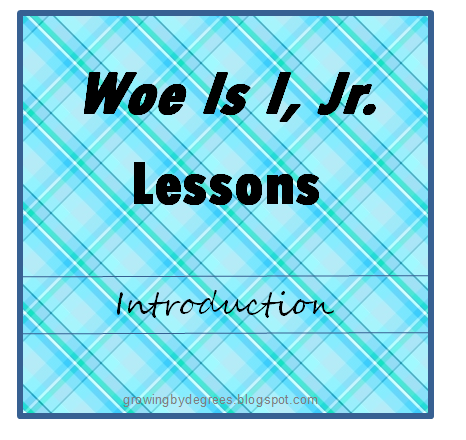It wasn't long ago that I mentioned a grammar handbook for kids: Woe Is I, Jr. by Patricia T. O'Conner. I said then that I might work the book into lessons here, but I changed my mind and made supplementary lessons for the book instead.
I will post them on Mondays, chapter by chapter. Choose as many or as few as you like. The goal is to enliven the study of grammar by moving kids, grades 5ish to 8ish, away from the monotony of workbooks to assignments that allow them to tap into their creativity.
Having the book will be essential. It is the spine of the study.
Okay, call your student(s) to the computer. It's time to begin!
*****
Let’s start by playing a little game, okay? I say a word.
You blurt out the first word that comes to mind.
Ready?
Here we go.
Ice cream:
Beach:
Grammar:
If you’re like most kids, you probably said happy words
for ice cream and beach and a not-so-happy word for grammar. But here you are
with not only a grammar handbook but a supplement as well—and not a beach or
bowl of ice cream in sight. Poor you!
It’s okay, though; it won’t be as bad as you think. At
least I hope not. The goal is not to transform you into a grammar guru but to
help you master the basics of your language which will benefit your life no
matter where you go, no matter what you do.
Fortunately for you, Ms. O’Conner didn’t write a dense,
dry, boring book. She wrote a lively one, engaging and witty. Through the text,
she talks directly to you, the “younger grammarphobe.”
But I must warn you that she makes an assumption about
kids: she assumes you are attracted to words that erupt from your ears, nose, and
mouth. You know, words like earwax and boogers, vomit and belch. If vocabulary
like this grabs your attention, be prepared to chuckle as you learn. If it
offends you or insults your intelligence, overlook it to explore the concepts
underneath. Remember, the alternative is dense, dry, and boring.
1. READ each chapter carefully, pretending that Ms. O’Conner is your tutor sitting beside you on the couch. When she asks you to do something, do it. Avoid the temptation to be a passive reader. Instead, think, engage, learn. Letting your eyes glaze and your mind wander will only waste your time, and you’ll know no more grammar than when you started.
2. WRITE short pieces to help you apply the concepts you are learning. After all, if you can’t apply the grammar, what good is it? Right? I can’t hear you. Right? (Typing the pieces is recommended, as it will make the entire process easier.)
3. COMPLETE the handouts included with this supplement. Handout titles are underlined and linked.
4. PRACTICE concepts by following the links to more grammar fun.
You are now ready for the introduction. Enjoy!
 1. Read the Introduction of Woe Is I, Jr.
1. Read the Introduction of Woe Is I, Jr.2. Are you a grammarphobe, “somebody who has a phobia, or, fear, about grammar”? If you were to camp on the line below, where would you pitch your tent?
(I’ll check in with you later to see if the tent moves one way or the other.)
3. Okay, get it out of your system before you read any farther. Write a piece about anything—your opinion of grammar, for instance—with your absolutely worst grammar. Put punctuation marks in random places. Spell words incorrectly. Forget capital letters. (Even if you don’t have a single English teacher gene in your body, the sight of your writing will probably make you tremble.) Read it aloud. What do you think? Then give it to a friend to read. What is his/her reaction?
4. How much do you already know about grammar? Well, let’s find out. In the left column of Grammar Glossary, write what you know about each word. Don’t worry if the sheet is bare when you’re finished. Blank spaces show you have some learning to do--which isn’t a bad thing.
5. I would love to see your "bad writing" example. Would you mind putting it in the comments?
Go to Lesson 1
3. Okay, get it out of your system before you read any farther. Write a piece about anything—your opinion of grammar, for instance—with your absolutely worst grammar. Put punctuation marks in random places. Spell words incorrectly. Forget capital letters. (Even if you don’t have a single English teacher gene in your body, the sight of your writing will probably make you tremble.) Read it aloud. What do you think? Then give it to a friend to read. What is his/her reaction?
4. How much do you already know about grammar? Well, let’s find out. In the left column of Grammar Glossary, write what you know about each word. Don’t worry if the sheet is bare when you’re finished. Blank spaces show you have some learning to do--which isn’t a bad thing.
5. I would love to see your "bad writing" example. Would you mind putting it in the comments?
Go to Lesson 1




No comments:
Post a Comment